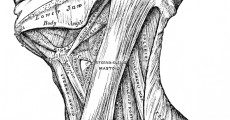Original Research Article by Adrian Mendez, Hadi Seikaly, Kal Ansari, Russell Murphy and David Cote published in the Journal of Otolaryngology – Head & Neck Surgery 2014 (Volume 43)
Abstract
Introduction
Video teaching modules are proven effective tools for enhancing student competencies and technical skills in the operating room. Integration into post-graduate surgical curricula, however, continues to pose a challenge in modern surgical education. To date, video teaching modules for neck dissection have yet to be described in the literature.
Purpose
To develop and validate an HD video-based teaching module (HDVM) to help instruct post-graduate otolaryngology trainees in performing neck dissection.
Methods
This prospective study included 6 intermediate to senior otolaryngology residents. All consented subjects first performed a control selective neck dissection. Subjects were then exposed to the video teaching module. Following a washout period, a repeat procedure was performed. Recordings of the both sets of neck dissections were de-identified and reviewed by an independent evaluator and scored using the Observational Clinical Human Reliability Assessment (OCHRA) system.
Results
In total 91 surgical errors were made prior to the HDVM and 41 after exposure, representing a 55% decrease in error occurrence. The two groups were found to be significantly different. Similarly, 66 and 24 staff takeover events occurred pre and post HDVM exposure, respectively, representing a statistically significant 64% decrease.
Conclusion
HDVM is a useful adjunct to classical surgical training. Residents performed significantly less errors following exposure to the HD-video module. Similarly, significantly less staff takeover events occurred following exposure to the HDVM.
Journal of Otolaryngology – Head & Neck Surgery 2014, 43:7 doi:10.1186/1916-0216-43-7
The electronic version of this article is the complete one and can be found online at:http://www.journalotohns.com/content/43/1/7

